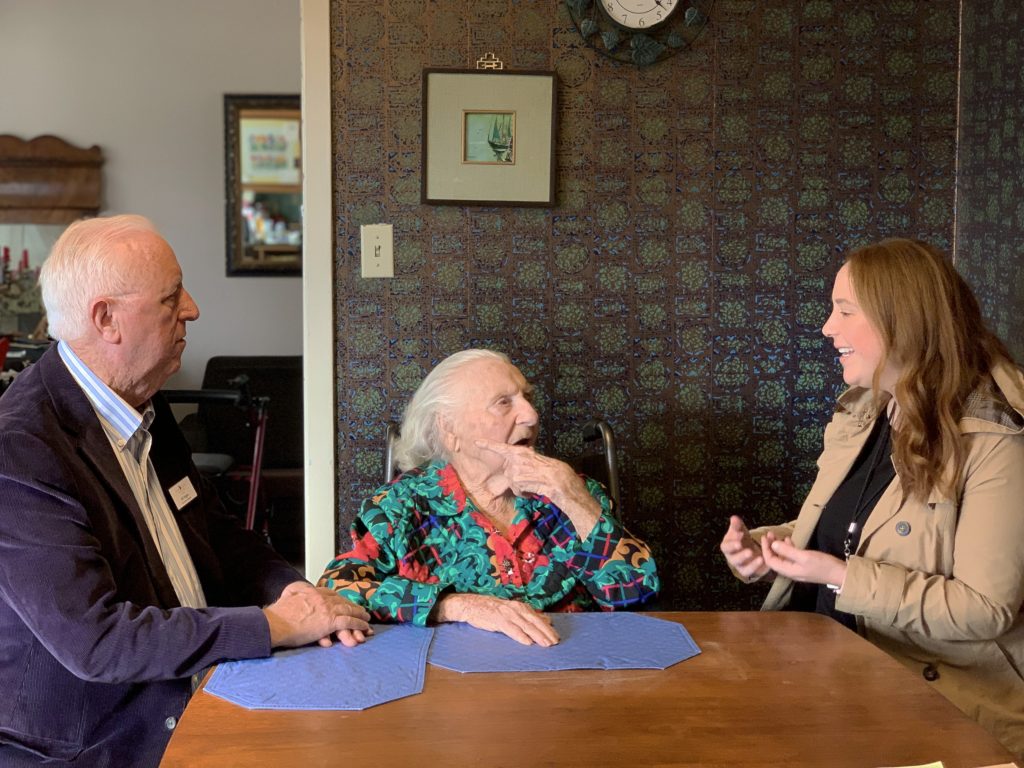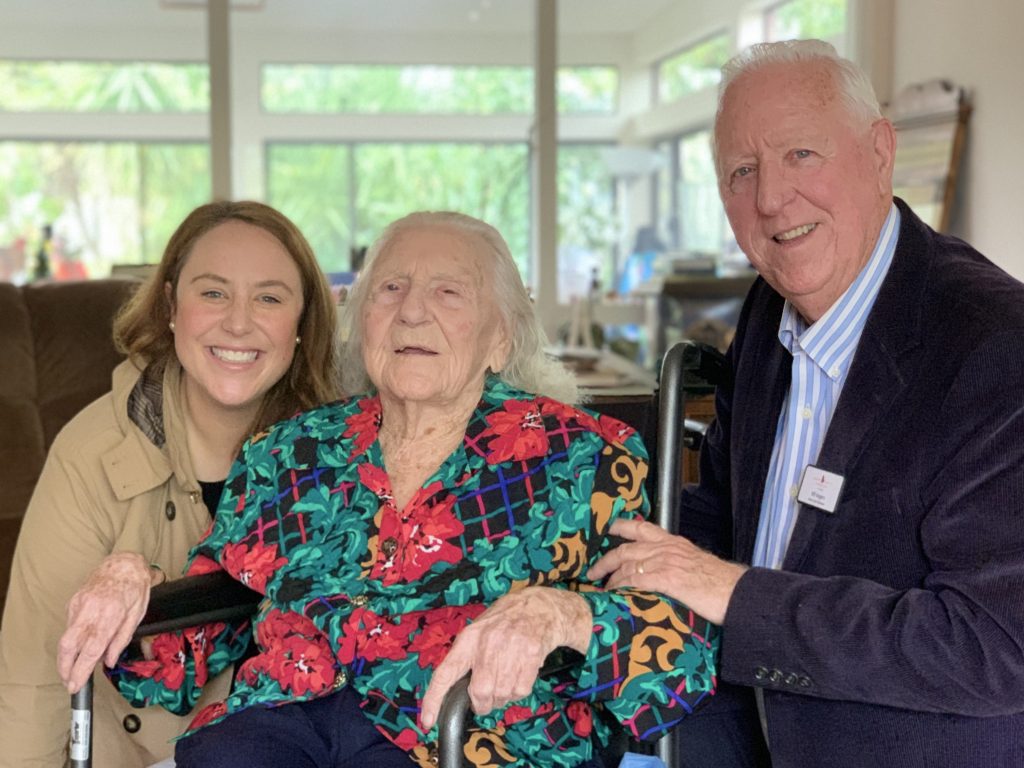Tess Murphy, LCSW
A day in the life of a social worker
Listeners, problem-solvers, advocates, and much more, social workers wear many hats. Mission Hospice social worker Elizabeth (Tess) Rogers says that her job is “pairing what resources and support are available with what families are ready for.”
Tess aims to see each of her patients every two weeks, or more often as needed – patients’ needs may change over time. Some days Tess visits three or four patients; other days she spends more time making calls, faxing paperwork, or following up on MediCal or VA benefits.
“While nurses and physicians help with physical pain, we can help with emotional pain, resources, and counseling – for patients and families,” Tess explains. “Our job is to hold space for everyone to express their feelings, their fears, and their wishes, and to be the mediator as needed.”
On a recent day, Tess started with a phone call from a nurse who needed some advice about how to assist a struggling family. “It’s part of our job to support our fellow team members,” Tess explains. “We have such a supportive, compassionate team – we all have each others’ backs.”
 By the time this conversation has finished, Tess has arrived at the Millbrae home of her first patient.
By the time this conversation has finished, Tess has arrived at the Millbrae home of her first patient.
Opal, a retired professor with Alzheimer’s disease, recently turned 102, and Tess brings with her a small box of doughnuts to celebrate. She’s welcomed like family by both Opal and her caregiver.
With her wheelchair scooted up to the dining room table, Opal eats breakfast while Tess visits. Warm and gentle, Tess asks Opal about her childhood on a Mississippi farm, skillfully working in questions about her pain level and mood.
“Is there anything on your heart that you want to talk about?” Tess asks. Opal says she wouldn’t change a thing about her life, something Tess says is a good reminder of staying in the present and expressing gratitude.
Tess also reassures the caregiver that she’s doing a good job. “Part of my role is to encourage the patient and family, to let them know that they can do this,” she says.
While stopping for a second cup of coffee, Tess makes some notes about the visit for other members of the care team. And later, she will – as usual – call Opal’s daughter Pam with an update. She explains: “Sometimes I work more with the family than with the patient. A lot of our work is helping families accept what is happening, while acknowledging their pain, grief, and sadness.”
Tess’ next stop is at the Redwood City home of John and Michelle. When John, who has prostate cancer, started hospice care, his wife was reluctant to accept social work support. After Tess offered to stay with him so Michelle could attend her church meetings, that built trust that allowed Tess to provide even more meaningful support to the family.
Tess explains that much of her work with this family has been counseling. “Both of them were angry about John’s disease. I was able to help them talk through it so that they could project their anger onto the disease, and not each other.” Tess also facilitated family meetings with their two adult daughters, who wanted to be more involved in care and decisionmaking.
Today, Tess talks to John about his veterans’ benefits, which she facilitated so that he could get the VA caregiver he had earned. Helping people navigate benefits and find resources is an important part of the social work role.
Only partly joking, Tess says that social workers are “the forms people.” In addition to helping people navigate insurance benefits, MediCal and Medicare, and paid family leave, they help people complete Advance Health Care Directives and review their POLST forms.
Social workers also help navigate care at a very practical level. “We can start the conversation about where the best place is for care. We help determine whether the patient is safe in the home, or needs care beyond what family members can provide.”
 After her visit with John and Michelle, Tess heads north again to her patient in an assisted living facility in Burlingame. Harold, at 93, has congestive heart failure. In a single week, he moved into the facility and started hospice care – quite a change for the vibrant, independent man. Tess says that she visited weekly at first, to help him adjust to his new environment.
After her visit with John and Michelle, Tess heads north again to her patient in an assisted living facility in Burlingame. Harold, at 93, has congestive heart failure. In a single week, he moved into the facility and started hospice care – quite a change for the vibrant, independent man. Tess says that she visited weekly at first, to help him adjust to his new environment.
When he first moved there, she orchestrated a care conference with Harold and his children, the entire Mission Hospice team, and facility staff. Tess explains that “these meetings lay the foundation for the patient’s care, who does what, and making sure the family understands how we can support them. We are always there to advocate for the patient.”
The staff at Harold’s home now knows Tess well. As part of her visit with Harold, Tess observes and records his appearance, eating habits, and alertness.
Harold is a big sports fan, something he loves to share with his Mission Hospice volunteer – who just happens to be Tess’ dad Bill. The father-daughter duo often visit patients together. “It’s the biggest joy to be able to do this work together,” says Tess. “I think patients get a sense that they’re really being cared for – it’s a family thing.”
Her main objective is to help Harold review his life and prepare to die peacefully. Over the past few months, Tess has talked with him about his childhood and the many things he has accomplished. She’s also helping him through depression and grief from his wife’s death four years earlier. “My job is to hear his story, to witness and help him process his life.”
Back in the Mission Hospice office, Tess will finish her notes for these patients, plan tomorrow’s visits, make a few phone calls, and check in with her colleagues – an important part of her day. “Experiencing someone’s vulnerabilities is such an honor – but it can be difficult. It’s so helpful to be able to unpack that with a colleague who gets it,” she says.
“Ultimately, bearing witness to someone’s anger or grief is the biggest gift. That’s when I feel like I am really helping. That’s what is so rewarding about this work.”

